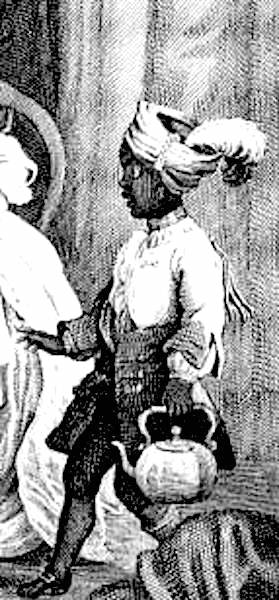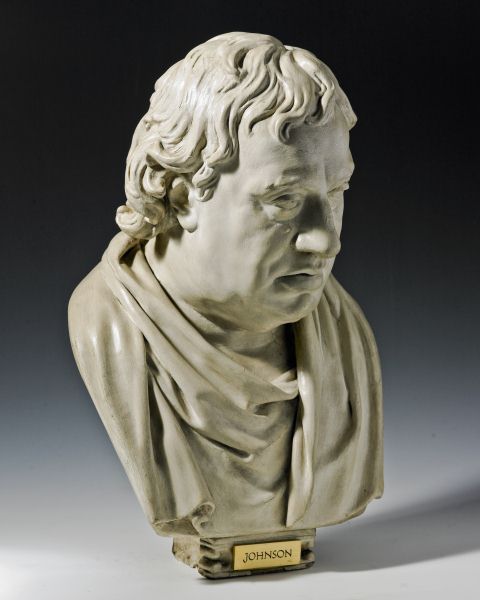
Despite his awkwardness, disheveled appearance, tics and grunts, inner conflicts, proneness to depression and physical afflictions, Dr Johnson had (and still has) many fans. In his recent biography Peter Martin explains how he became a cult figure, "a literary and social icon" in his own age (xii), maintaining this status at least into the nineteenth and early twentieth century because of the continuing popularity of Boswell's biography of him. But, Martin points out, Boswell gave a wrong impression of his famous subject. "Far from being a spokesman of the Establishment and Tory cause," for instance, "he was one of the strongest advocates for the abolition of slavery, treating his own black servant Frank Barber as a son, 'freeing' and educating him, and leaving most of his estate to him in his will" (xv-xvi). This is not quite accurate: Frank had already been "freed" by his first master, a Colonel, under the terms of his will. But it is true that Johnson treated him entirely as a free man, and sent him to school to be educated, as well as making him his heir. Geoffrey Finch's début novel shows how this relationship grew, doing much credit to both parties involved.

But first, what does "freeing" mean, in the context of Georgian England? Surely there were no slaves here? Take a look at William Hogarth's Harlot's Progress, Plate II. The little black boy in the far right, carrying a kettle, is smartly liveried — with a slave collar round his neck. David Olosuga discusses the prevalence of such children in the houses of the wealthy and even the not so wealthy. The blacker the better, because then they complemented the (white) family scene, as well as providing useful services for the cost of board and lodging. They had their social lives too, among themselves and their white peers, those whom they worked alongside in the household (see Olosuga 87ff.). According to Martin there were some 15,000 black people in the population in 1772, "most of whom were slaves" (249). It was not only a lowly but a perilous existence. If their owners fell on hard times, they might be sold and shipped back to the plantations, as almost happens to Frank's friend Costano here. Even those who had the good fortune to be helped by their ex-masters might easily find themselves a prey to circumstances, like another of Frank's friends, Obadiah. The black life of eighteenth-century London, which will probably come as a revelation to most readers, is brilliantly brought to life in Finch's novel.

Bust of Dr Johnson, after Joseph Nollekens R.A. (1737-1823), at the Athenaeum Club, London.
However, Dr Johnson's relationship with Frank provides the main focus here. Johnson's wife Tetty had been buried a mere fortnight before the ten-year-old came to him, after the death of the Colonel who had freed him. Johnson had the boy educated at some expense, and Frank for his part has served him faithfully ever since. Around these two revolve the other eccentric characters who fill or pass through the house in Johnson's Court, off Fleet Street. Here is Boswell, of course, sitting by the fire recovering from his latest bout of self-indulgence; Dr Levet, "a gaunt and withered man" ever ready to let Johnson's blood; Poll, whom Johnson had personally rescued from the streets, and whom Dr Levet describes as "a gaudy tulip sprung from dung"; Mrs Williams, better known as "the shrew" or the "Welsh shrew"; and Agnes, her Scottish maid. "All we are wanting now is an Irish cook and we shall be a miniature kingdom," as Johnson observes to Boswell, who responds (since Johnson has just been rude about Scotland), "Though scarce united sir."
The dialogue is so deftly handled that it is hard to say how much the wit owes to Johnson himself, and how much to the present author — their contributions are brilliantly blended. This holds true when it comes to other historical characters, like the Thrales, among whose guests at a dinner party are Sir Joshua Reynolds and David Garrick, who engage in a memorable exchange over the punch bowl. The conversation at table with the Thrales and Miss Sophie Gordon, an actress, is no less entertaining. Meanwhile the banter of the fictional characters, whether below the stairs or on the periphery of society as slaves or ex-slaves, is equally convincing. It is not strange that Frank's friends should be seen gathering in his master's house: Johnson allowed this. It was one of the signs of his sympathy for those kept as slaves in London (see Martin 306). Here as elsewhere the narrative is more firmly founded on fact than might be supposed.
Finch presents Frank's friends and acquaintances with the same sensitivity and humour that he brings to Dr Johnson and his circle. They provide a rich cast of subsidiary characters which helps to recreate the texture of lower-class London life. For example, Frank experiences life both above and below the stairs at the Thrales (this is where he meets his future wife, Betsy), and on another occasion along with his friends has a lucky escape from a press gang. Later, he is sent to see if he can help Lizzy, once the Thrales' scullery servant, who has landed in the Fleet after eloping with his friend Famistan, and having an abortion. There are visits to fairs, at one of which one of the black entertainers, Adebayo, falls to his death from a tent-top act. In the quest for Costano, who has been illegally sold by his master, Frank visits Whitechapel, "a place for cut-throats and thieves," and the docks, where the quest reaches a dramatic conclusion. Yet this is not an episodic narrative. Running through it all are the ups and distressing downs of Dr Johnson's last days, and the mystery surrounding Frank's birth. With some subtlety, the last clues about the latter are left for the reader to follow.
Dr Johnson emerges from Sam's Boy as a truly sympathetic character, as does Frank, in his own way. While owing much to its historical foundations, the narrative is not at all constrained by them. In real life, Frank is thought to have frittered away his inheritance, but here he loses it through illness, and being unable to work. In real life, too, Frank's marriage has been described as unhappy, whereas (up to the point at which the novel ends, anyway) Betsy is a loving wife. By turns moving, surprising, troubling, annoying (because of people's unabashedly racial attitudes), and entertaining (because of the wit), this is an extremely accomplished first novel.
Bibliography
[Book under review] Finch, Geoffrey. Sam's Boy. 2018. 370 pp. £4.57. Ebook. Available from Amazon.co.uk and Amazon.com. £4.57 / $5.99. ASIN: B07FP8714R
Martin, Peter. Samuel Johnson: A Biography. pbk ed. London: Phoenix, 2008.
Olosuga, David. Black and British: A Forgotten History. London: Macmillan, 2016.
Created 13 August 2018